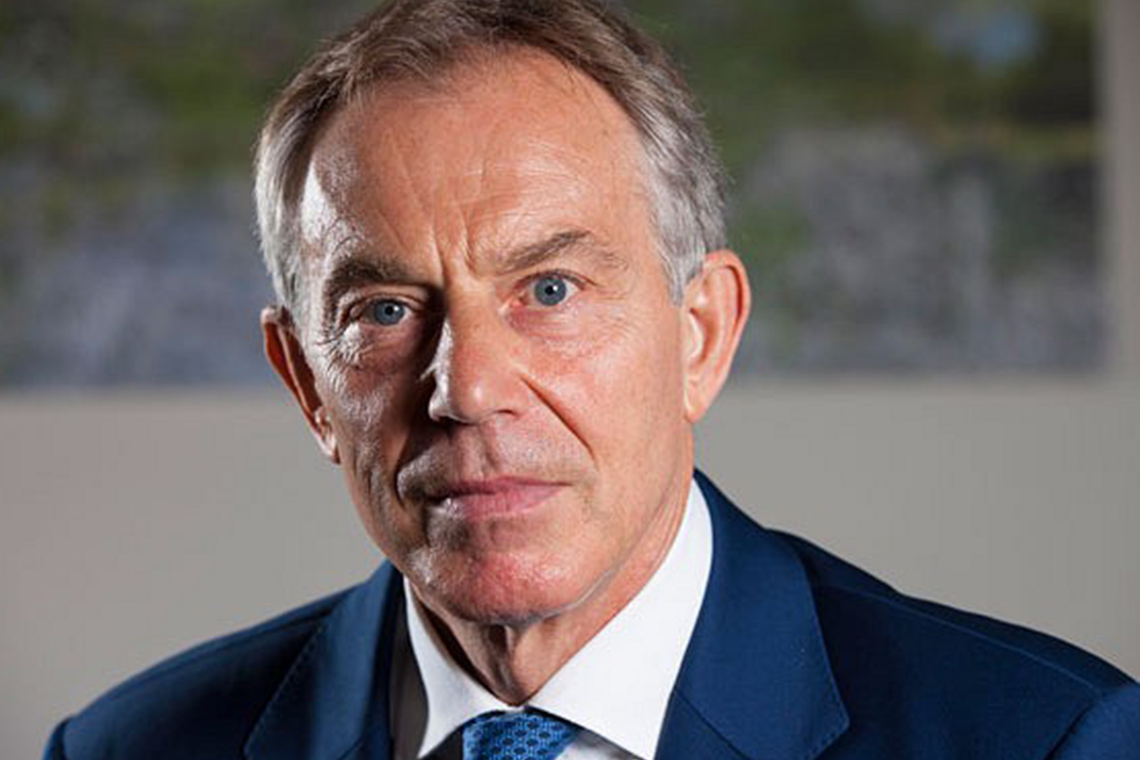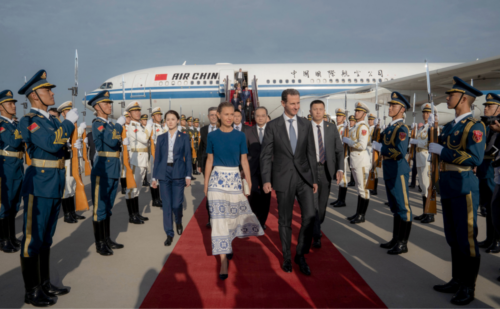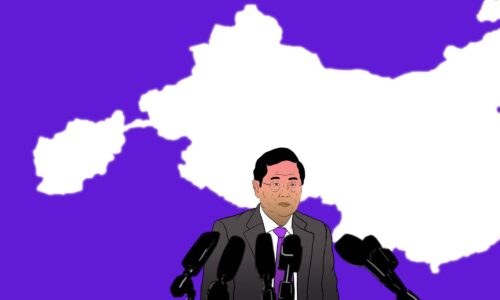The China-Arab Expo – China’s latest top news
A roundup of the top China news for June 2, 2017. Get this free daily digest delivered to your inbox by signing up at supchina.com/subscribe.

Schmoozing the Middle East in Ningxia
China’s Ministry of Commerce (MOFCOM) announced that the third “China-Arab State Expo” is to be held in September this year in Yinchuan, the provincial capital of northwestern Ningxia. The region’s formal name is Ningxia Hui Autonomous Region. Roughly a third of its population of around 6 million people identify as Muslim, and most of them are Hui, a minority group who have generally found an easier coexistence with the Han Chinese majority than other Muslim ethnicities such as the Uyghurs of Xinjiang.
According to the Global Times, a MOFCOM spokesperson said that the second China-Arab State Expo had seen “the signing of agreements on 241 projects with combined investment value of 183.04 billion yuan ($26.84 billion).” The Global Times also notes that “the 2017 Expo will thoroughly carry out the spirit of the Belt and Road Forum that was held in May in Beijing,” with guests from invited countries along the Belt and Road route including “Indonesia, South Africa, Kazakhstan, Mongolia and others, with Egypt as the guest of honor.”
The People’s Daily’s coverage of the expo is focused on the benefits that will come to Ningxia: In an article (in Chinese) subtitled “Opening up the massive opportunities of a connected Ningxia,” the Party newspaper says that aside from the growth of exports that the China-Arab State Expo and Belt and Road will bring, many well-known global companies have already set up shop in Ningxia, such as Starbucks, Amazon, and Associated British Foods (which makes Twinings tea).
Yinchuan is the site of what Kyle Haddad-Fonda calls “a lavish theme park that celebrates the history and culture of China’s largest Muslim ethnicity, the Hui.”
Mr. China in Brussels
Politico has profiled Luigi Gambardella, a type familiar to anyone who has spent time in business and diplomatic circles in Beijing and Shanghai. He is “the founder of the ChinaEU business lobby, a tireless — some would say relentless — advocate for deeper economic ties between Beijing and Brussels.” He is a somewhat controversial figure: The article mentions an “international outcry after his lobby sided with Russia, China and Middle Eastern states in an effort to give a United Nations body some control over the internet,” and “one memorable interview with China Daily,” when he called Chinese President Xi Jinping’s vision for the internet “inspiring.”
Politico quotes “one telecoms exec” who calls Gambardella “a fantastic PR man, very energetic and very hardworking.” But Joerg Wuttke, the president of the European Union Chamber of Commerce in China, called him “Radio Beijing,” and says, “He is not transparent because he is not clear about who he represents or what he does.”
—Jeremy Goldkorn, Editor-in-Chief
Women are building real businesses selling homemade knockoff clothing online
Simone McCarthy has a Q&A with Sara Liao on shanzhai fashion and “women’s digital work.”
See also a The China Project video on Shanzhai, China’s underground fashion phenomenon.
The politics of passing on
David Bandurski writes on how in China, the death of a esteemed comrade is never strictly a private matter.
Viral video Friday
Fascinations of the Chinese internet, May 29-June 2: A five-layer highway overpass, an angry nyotaimori girl, and more.
This week on The China Project:
- Sinica Podcast: Kai-Fu Lee on artificial intelligence in China
- Kaiser Kuo: America should stop sneering at China’s Belt and Road initiative
- The plight of China’s family planners
- The Communist Youth League will help you find love: WeiWatch, May 24-31
This week’s news roundups are:
- May 30: Taiwanese man accused in Hunan of subverting the state
- May 31: What is going on at Ivanka Trump’s Chinese shoe factory?
- Jun 1: China confirms commitment to Paris deal as Trump withdraws
This issue of the The China Project newsletter was produced by Sky Canaves, Lucas Niewenhuis, Jia Guo, and Jiayun Feng. More China stories worth your time are curated below, with the most important ones at the top of each section.
BUSINESS AND TECHNOLOGY:
China’s top courier breaks ties with Alibaba’s logistics giant
SF Express (顺丰速运 shùnfēng sùyùn), China’s largest delivery firm, and Cainiao Networks (菜鸟网络 càiniǎo wǎngluò), the Alibaba-owned logistics operating giant, have broken ties over a data dispute. SF became uncomfortable with repeated requests for data from its partner Cainiao, which handles logistics for over 80 percent of express courier packages in China, and on May 31 became the first part of Cainiao’s network to break a logistics arrangement, Caixin reports. SF made headlines in February this year when its founder, Wang Wei 王卫, became China’s third-richest man practically overnight as his company enjoyed a wildly successful listing on the Shenzhen Stock Exchange.
- China flips the switch on world’s biggest floating solar farm / SCMP
“Plant occupies flooded area once used for coal mining and can generate 40 megawatts of electricity — enough to power 15,000 homes.” - China’s new-energy vehicle sales fire on all cylinders / Caixin
A look at how government tweaking of subsidies for electric cars affects sales numbers. - Wages for China’s newest college grads are plummeting / Bloomberg
- China’s largest bitcoin exchanges allow withdrawals again / Bloomberg
- Chinese insurer Anbang denies report that chairman not able to leave China / Reuters
“Wu Xiaohui, the chairman of Anbang Insurance Group, is free to travel, a spokesman for the Chinese insurer said on Friday, denying a report that Wu had been prevented from leaving China. The Financial Times reported that Wu had been stopped from leaving the country, citing four sources who have had business dealings with him.” - China to ease foreign investment restrictions on automobile sector / Caixin
- Yuan forecasters getting it wrong as China jolts markets / Bloomberg
- Former head of Chinese steel company with links to Australia jailed / Sydney Morning Herald
POLITICS AND CURRENT AFFAIRS:
Ivory prices down after ban, activists fear stockpiling
The Guardian reports that “the price of raw ivory in Asia has fallen dramatically” since the Chinese government banned the domestic legal ivory trade at the end of 2016. The Wildlife Justice Commission (WJC) has been collecting ivory prices in Hanoi, Vietnam, for the past three years: In 2015, raw ivory was being sold for an average of US$1,322 per kilogram; this dropped to $750 per kilogram by October 2016, and down to $660 per kilogram in February this year.
Despite the fall in prices, the numbers of elephants being poached have not fallen, and there are worries that speculators are stockpiling ivory while it’s cheap, meaning that there will be no reduction in demand.
- Inner Mongolia has become China’s model of assimilation / The Economist (paywall)
- The return of Psy to China’s charts is the surest sign yet of a thaw between Seoul and Beijing / Quartz
Korean pop stars, including Big Bang and “Gangnam Style” star Psy, are rising on various Chinese pop music charts, after months of cool relations between the two countries during which Korean companies and entertainers had little joy in the China market. - EU, China united on climate, still divided over trade / Reuters
- China’s media calls Trump’s withdrawal from Paris accord ‘global setback’ / Reuters
- Australia’s loyalties are shifting from the U.S. to China / NPR
SOCIETY AND CULTURE:
Regulator tries to tame online video, again
The State Administration of Press, Publication, Radio, Film, and Television (SAPPRFT), China’s media watchdog, recently issued a notice banning online entertainment shows with “incorrect values” (不正确的价值取向 bù zhèngquè de jiàzhí qǔxiàng) in order to “further spread advanced socialist culture” and “cultivate a healthy and positive internet atmosphere.” The ban is aimed at any digital platform that can host video content. It emphasizes that shows streamed online are subject to the same standards of radio and TV programs, and that they should “consciously stay away from vulgar taste.”
The notice also prohibits the circulation of uncut footage or censored content from authorized shows, possibly a reaction to the wide online circulation of 14 minutes of violent scenes that were deleted from the version of the Hollywood film Logan screened in China in February.
On the social media platform Weibo, the notice drew a barrage of criticism (in Chinese) from internet users. One commenter wrote, “If there is a ranking of Chinese government departments that people hate the most, SAPPRFT must be the first.” Others, who were capable of jumping the Great Firewall, commented, “Since we can get access to Twitter and YouTube, why does SAPPRFT still think that these regulations will be effective?”
SAPPRFT has been trying to regulate online video since at least 2006 (before the film regulatory body SARFT merged with press and news regulator GAPP). However, whereas cinema and broadcast TV are completely under the control of SAPPRFT, online video is subject to regulation by a number of different government organizations, including the Cyberspace Administration of China (CAC). This means that SAPPRFT orders do not always have teeth.
- Stanley Cup fever translates well in China / Toronto Star
The Chinese TV feed from North America’s ice hockey championship Stanley Cup has been drawing regular audiences in China of more than 22 million. - Europe to ‘fight’ China for 2030 World Cup as UEFA insists: ‘It’s our turn’ / SCMP
- English Premier League boss: China’s grand football ambitions are an opportunity, not a threat, for us / SCMP





